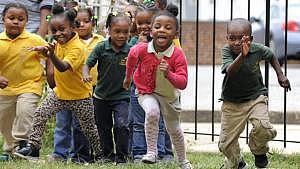Health Journalism Fellows honored for public health reporting

Last week, journalists Andrea McDaniels of the Baltimore Sun and Karen Bouffard of the Detroit News learned that the Association of Health Care Journalists would be honoring them with first-place and third-place awards, respectively, for public health journalism from a large newspaper.
McDaniels spent more than a year on Collateral Damage, which movingly describes the toll of violence on residents of a Baltimore neighborhood. The project provides vivid examples and a clear elucidation of the complex science that shows how the life trajectory of young children can be profoundly shaped by early exposure to trauma. But most of all, it reels you in with the stories of children as young as three or four who already are visibly suffering from living in a community where it isn’t uncommon to hear gunshots or to know someone who has died a violent and often seemingly capricious death.
For the longest time, McDaniels, the Sun’s health reporter, had the topic of violence on her story to-do list. Why, she wondered, did it show up year after year as one of the top 10 health disparities in the city of Baltimore?
"Sure, I knew hundreds of residents died in homicides or were hurt and even disabled during assaults,” she wrote in an essay about her project for Reporting on Health. "But I wondered if there was something deeper going on that needed to be explored.”
Further research soon exposed her to studies that showed that “violence was creating communities throughout the country of stressed and traumatized people,” she wrote. “Residents were walking around with anxiety disorders, children struggled to learn and toddlers lacked emotional control.
McDaniels took as her focal point for the series the survivors of violence rather than the perpetrators or direct victims. And she brought home why violence could be a health issue, chronicling the slow insidious toll on residents who live with fear and uncertainty long after the police tape is removed and the ambulances drive away.
It took courage and commitment from McDaniels to stay with a story that was difficult to tell and challenging to report. Winning trust in a Baltimore neighborhood like Upton/Druid Heights isn’t easy. But Sun Executive Editor Trif Alatzas and special project editor Diana Sugg urged McDaniels to stick with the project and ultimately committed other newsroom resources -- from videographers to graphic artists.
Karen Bouffard also took an unconventional approach to a health story with “Surviving through 18,” her data-driven investigation of the hazards that could befall a child growing up in Detroit. She discovered, through an in-depth comparison to other mid-size and large cities, that Detroit is the most dangerous urban environments to be a child in America because of the toll of immature births and homicides.
The series spurred action by Detroit’s mayor almost immediately. Within days of its publication, Detroit Mayor Mike Duggan announced plans for a massive campaign to attack infant mortality in the city, which Bouffard had reported had the highest rate in the nation. Duggan secured funding from two foundations to guarantee that all pregnant women in Detroit would receive prenatal care over the next three years.
Bouffard began her project seeking to chronicle the health toll of the Great Recession in Detroit. “Initially,” she wrote for Reporting on Health, “I wanted my 2013 National Health Journal Fellowship project to focus on how infant mortality was impacted by Detroit’s economic free-fall. It made sense that as community resources dried up, pregnant mothers would have less access to quality food, housing and medical care. But at the same time, crime increased dramatically in the city, and story after story told of another baby, child or teenager dying of violence. So even if a baby made it through that crucial first year of life, it was clear that children who grow up in Detroit face greater risks of dying before adulthood than their suburban counterparts.”
Like McDaniels, Bouffard also benefited from the support of top leadership at her newspaper. Managing Editor Gary Miles urged Bouffard to dive deeper to understand how the Detroit story fit into a national context. The arresting finding that resulted – that Detroit fared the worst compared to other cities – brought a powerful and immediate public policy response.
Both McDaniels and Bouffard wrote their series as participants in our 2013 National Health Journalism Fellowship, which was funded by a generous grant from The California Endowment. During our programs, we aim to broaden and deepen how reporters approach the topic of health – to include the impacts on violence, poverty, racial discrimination and environmental conditions. So we are so delighted that these excellent projects have received recognition from the profession.

